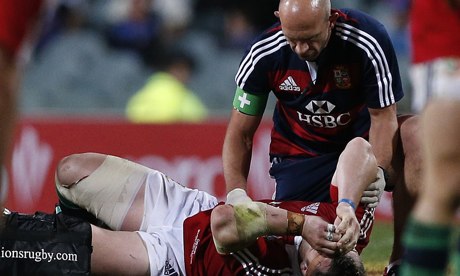
The International Rugby Board has defended its record on combating concussion after coming under fire from medical figures for failing to do enough to tackle the problem. One expert in neuroscience even predicted that there could be a surge in lawsuits, as has happened in American Football, from players who have suffered brain-related injuries.
The board's statistics, however, indicate that its concussion protocol, which was introduced two years ago, has led to a significant decrease in the number of players remaining on the field with serious head injuries.
Since the start of the protocol, which stipulates that a player who has suffered a disorienting bang on the head should be taken off the field and assessed by accredited medical officers, the number of players remaining on the field who were later diagnosed with concussion has fallen from 56% to 13%. "That figure is still too high but it is a significant improvement in a short time," said an IRB spokesman. "This is an area we take extremely seriously and since the 2012 conference on concussion in sport in Zurich we have worked very closely on this with the International Rugby Players Association.
"Our message to the rugby community at all levels is a simple one: recognise and remove. Players, coaches, teachers and parents should recognise the symptoms of concussion and remove a player permanently from playing before following a graduated return to play."
Dr Barry O'Driscoll, a former member of the IRB's anti-doping committee, accused the board of not placing enough importance on treating concussion and has called for mandatory awareness training for coaches and players at grassroots levels.
The IRB said its policy was overseen by an expert group featuring leading neurologists and driven by evidence-based expert research and international best-practice rather than individual opinion.
Medical officers who examine players during matches under the concussion protocol must gain accreditation by attending a course on head injuries run by the IRB and independent doctors will oversee next month's internationals in Europe.
"Our approach is based on four key areas," said the spokesman. "The first is prevention, based on strong laws, the monitoring of referees' performances, disciplinary procedure and correct technique education.
"We have an education programme through irbplayerwelfare.com, a concussion management policy and a research programme that involves the commissioning of long-term health studies and reviewing the case of every player who is treated under the five-minute protocol.
"Our policy is both proactive and protective, recognising the differences in the community and elite games and following the key Zurich recommendations. Concussion is a complex and sometimes emotional topic and our strategy is deigned to promote the very highest standards of education, coaching and medical care."

